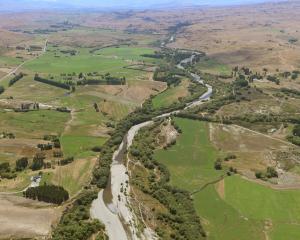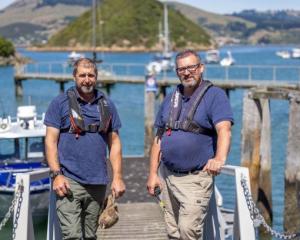Resource management director Dr Selva Selvarajah yesterday said legal action against farmers who took water from the Kakanui River after it had reached minimum flow on Wednesday was "not being ruled out".
The Kakanui and Shag Rivers were covered by consents under the Resource Management Act, and farmers had to stop taking water if they ran below 0.25cumecs, and could not start taking water until flows reached reached 0.4cumecs.
An investigation will be carried out over the next week into the breach.
Further south, farmers who took water from the Waianakarua River, which is not subject to minimum flow restrictions, were being asked to manage water conservatively.
Taieri farmers were also being asked to stop taking water.
While water uptake from the river was dominated by deemed permits which had no minimum flow levels, if levels continued to drop, permits would be stopped by legal action, Dr Selvarajah said.
"However, typically in such consistently dry conditions, cessation of all water takes will make very little difference to minimum flows."
ORC resource science manager Matt Hickey said about 30mm of rain was needed in Central and North Otago to help ease the worsening situation.
Yesterday afternoon, the Taieri at Waipiata was 0.9cumecs, the Shag at Craig Road was 0.08cumecs, and the Kakanui at Mill Dam was 0.4cumecs.
All three rivers were on low-level alert and irrigation takes had been suspended on the Shag since before Christmas and on the Kakanui since Wednesday.
Recent rain had not eased the situation as it was concentrated on the coast, Mr Hickey said.
River levels in the area had not been so low since 2003-04, he said.
"It's unusual to have them so low so early in the summer. If we don't get normal summer conditions, they will be in quite bad shape by the end of February."
It was important farmers using irrigation were "conscious of the conditions of their consents . . . they need to not take water when they shouldn't," he said.
A fish salvage operation began yesterday in the rapidly-drying Hakataramea.
Central South Island Fish and Game officer Graeme Hughes said several hundred trout fingerlings and salmon smolt, along with some trout and a few eels, were taken downstream to permanent water.
Meanwhile, hydro-electric lakes in the South were yesterday reported to be full to overflowing.
Meridian Energy, which operates six power stations on the Waitaki River, spilled a "small amount" of water from Lake Pukaki yesterday.
With Lake Tekapo sitting at 96% and rainfall predicted, Meridian was "keeping a close eye on things", external relations adviser Alan Seay said.
Contact Energy communications manager Jonathan Hill said the lakes feeding the company's Clutha River power stations at Clyde and Roxburgh were "very high".
Lake Hawea was sitting at an 80% level yesterday and there were "quite high" inflows into the Clutha River, Mr Hill said yesterday.
However, the company "didn't envisage" any spilling soon.
Dunedin hydrologist Dave Stewart blamed El Nino for the unbalanced water situation in the region.
The weather pattern, which favoured the northwest, dumped rain on the West Coast and produced dry winds which "suck any moisture out", in the east.
"Central Otago is by far the worst. It's been one of the driest periods they've had."
The region had been dry since September, with less rain than average recorded and there was no let-up in sight.
Mr Stewart expected this weather pattern to continue "right through until autumn".












